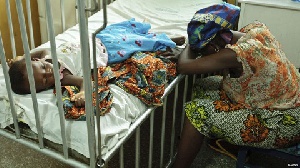 There were 216 million cases of malaria in 91 countries, an increase of five million in 2015
There were 216 million cases of malaria in 91 countries, an increase of five million in 2015
Malaria related deaths in the Northern Region have dropped to 71 per cent between 2015 and 2017 as residents embraced the Indoor Residual Spraying (IRS) campaign.
The IRS campaign is aimed at tackling malaria by killing the mosquitoes that transmit the malaria parasites through spraying insecticides on the walls, ceiling and their indoor resting places.
Dr Eric Tongren, Resident Advisor with USAID/Ghana, President's Malaria Initiative, said this in Kumbungu in the Northern Region at the 2018 launch of the IRS Campaign as a malaria control strategy to be implemented in seven selected districts in the Region.
The districts are; Bunkprugun Yunyoo, East Mamprusi, West Mamprusi, Mamprugu Moaduri, Kumbungu, Gushegu, and Karaga.
The campaign is being implemented by VictorLink projects and supported by the USAID President’s Malaria Initiative, forming a national collaboration between Ghana and the United States of America.
Dr Tongren said outstanding improvement had been achieved in malaria prevalence among children under -five years in the Northern Region, reducing the number of deaths.
He indicated that the resurgence of malaria was possible if efforts were relented on, and called for inclusiveness in the goal of eliminating malaria to save lives and enhance human capital.
Mr Kwashie Sammuel, the Director for the Northern Regional Health Directorate, said in spite of the decline in the prevalence of malaria among children, malaria continued to be the lead in morbidity and mortality in the Region.
He urged pregnant women and children to continue to sleep under the Long-Lasting Insecticide Nets and use the IRS methods for maximum protection.
Mr Abdul-salam Hamza Fataw, the District Chief Executive, said malaria affected productivity and drained the economy, which retarded development.
He appealed to residents within the Kunbungu District to cooperate fully with the IRS team during the spraying exercise to ensure success.